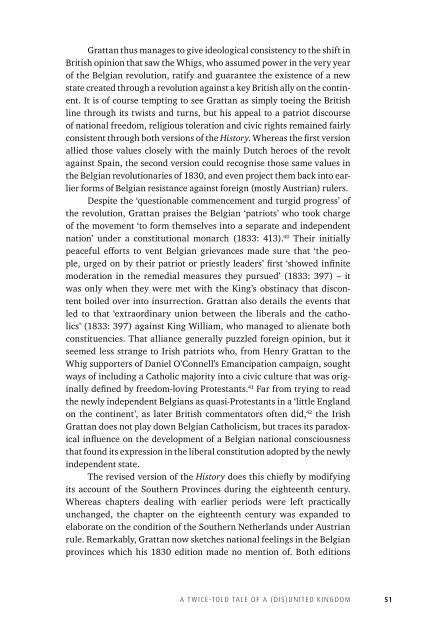Discord Consensus
7aze300jFJo
7aze300jFJo
You also want an ePaper? Increase the reach of your titles
YUMPU automatically turns print PDFs into web optimized ePapers that Google loves.
Grattan thus manages to give ideological consistency to the shift in<br />
British opinion that saw the Whigs, who assumed power in the very year<br />
of the Belgian revolution, ratify and guarantee the existence of a new<br />
state created through a revolution against a key British ally on the continent.<br />
It is of course tempting to see Grattan as simply toeing the British<br />
line through its twists and turns, but his appeal to a patriot discourse<br />
of national freedom, religious toleration and civic rights remained fairly<br />
consistent through both versions of the History. Whereas the first version<br />
allied those values closely with the mainly Dutch heroes of the revolt<br />
against Spain, the second version could recognise those same values in<br />
the Belgian revolutionaries of 1830, and even project them back into earlier<br />
forms of Belgian resistance against foreign (mostly Austrian) rulers.<br />
Despite the ‘questionable commencement and turgid progress’ of<br />
the revolution, Grattan praises the Belgian ‘patriots’ who took charge<br />
of the movement ‘to form themselves into a separate and independent<br />
nation’ under a constitutional monarch (1833: 413). 40 Their initially<br />
peaceful efforts to vent Belgian grievances made sure that ‘the people,<br />
urged on by their patriot or priestly leaders’ first ‘showed infinite<br />
moderation in the remedial measures they pursued’ (1833: 397) –it<br />
was only when they were met with the King’s obstinacy that discontent<br />
boiled over into insurrection. Grattan also details the events that<br />
led to that ‘extraordinary union between the liberals and the catholics’<br />
(1833: 397) against King William, who managed to alienate both<br />
constituencies. That alliance generally puzzled foreign opinion, but it<br />
seemed less strange to Irish patriots who, from Henry Grattan to the<br />
Whig supporters of Daniel O’Connell’s Emancipation campaign, sought<br />
ways of including a Catholic majority into a civic culture that was originally<br />
defined by freedom-loving Protestants. 41 Far from trying to read<br />
the newly independent Belgians as quasi-Protestants in a ‘little England<br />
on the continent’, as later British commentators often did, 42 the Irish<br />
Grattan does not play down Belgian Catholicism, but traces its paradoxical<br />
influence on the development of a Belgian national consciousness<br />
that found its expression in the liberal constitution adopted by the newly<br />
independent state.<br />
The revised version of the History does this chiefly by modifying<br />
its account of the Southern Provinces during the eighteenth century.<br />
Whereas chapters dealing with earlier periods were left practically<br />
unchanged, the chapter on the eighteenth century was expanded to<br />
elaborate on the condition of the Southern Netherlands under Austrian<br />
rule. Remarkably, Grattan now sketches national feelings in the Belgian<br />
provinces which his 1830 edition made no mention of. Both editions<br />
A twice-told tale of a (dis)united kingdom 51


